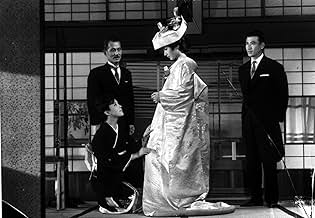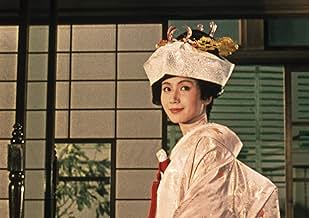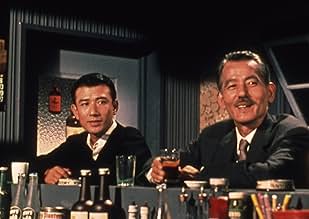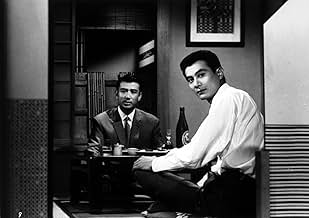Un viudo entrado en años acuerda el matrimonio de su única hija.Un viudo entrado en años acuerda el matrimonio de su única hija.Un viudo entrado en años acuerda el matrimonio de su única hija.
- Dirección
- Guionistas
- Elenco
- Premios
- 4 premios ganados y 1 nominación en total
- Dirección
- Guionistas
- Todo el elenco y el equipo
- Producción, taquilla y más en IMDbPro
Opiniones destacadas
It's also highly reminiscent of many of the mid to late Ozu films in a variety of ways. Like his usual style, the camera is stationary and often is at floor level--with cuts instead of closeups. You may not notice this at first, but it's clearly the director's trademark. In addition, the film has the typical slow and gentle pace and is about the conflicts between modern Japanese life and tradition. In this sense, there's not a lot that's too new about the film other than a light and modern (for 1962) soundtrack--very bouncy yet gentle.
As for the film, the father (Shuhei) has a pretty nice life. He has a nice job, often goes out with friends to drink and Michiko (the daughter) takes care of his needs at home. However, as the film progresses he notices in other people's relationships that something is missing. In particular, meeting with an old school teacher from 40 years ago is a wake-up, as this old man also lives with his unmarried daughter--and his life is a bit pathetic. Shuhei is afraid that in later years, his and his daughter will have a similar relationship. So, he and his married son go about trying to arrange a marriage for Michiko--who does want to marry, though judging by her outward appearance and insistence that she wants to stay home and take care of her father, you's never know it.
Overall, it's an incredibly slow but satisfying film and a nice end to Ozu's career, as it is his last film. Well worth seeing and full of lovely and realistic vignettes. For those who are looking for action and excitement, you may not like this film. For those who can appreciate a slower and more deliberately paced film, this is hard to beat. A lovely portrait of life in Japan circa 1962.
By the way, is it me or did those people in the film really drink a lot?! Wow!
¿Sabías que…?
- TriviaYasujirô Ozu: [static camera] There is not a single camera movement in the entire film, as in many of Ozu's films.
- Citas
[English subtitled version]
Yoshitaro Sakamoto: If Japan had won the war, how would things be?
Shuhei Hirayama: I wonder.
Yoshitaro Sakamoto: More whiskey! Bring us the whole bottle. If we'd won, we'd both be in New York now. New York. And not just a pachinko parlor called New York. The real thing!
Shuhei Hirayama: Think so?
Yoshitaro Sakamoto: Absolutely. Because we lost, our kids dance around and shake their rumps to American records. But if we had won, the blue-eyed ones would have chignon hairdos and chew gum while plunking tunes on the shamisen.
Shuhei Hirayama: But I think it's good we lost.
Yoshitaro Sakamoto: You think? Yeah, maybe you're right. The dumb militarists can't bully us anymore.
- Créditos curiososThe film title and credits are set against a backdrop of painted fronds.
Generally Yasujirô Ozu films have the credits placed before a backdrop of plain sackcloth.
- ConexionesFeatured in Yasujirô Ozu, le cinéaste du bonheur (2023)
- Bandas sonorasGunkan kôshinkyoku
(Warship March)
Written by Tôkichi Setoguchi
Selecciones populares
- How long is An Autumn Afternoon?Con tecnología de Alexa
Detalles
- Fecha de lanzamiento
- País de origen
- Idioma
- También se conoce como
- An Autumn Afternoon
- Locaciones de filmación
- Tokio, Japón(setting of the action)
- Productora
- Ver más créditos de la compañía en IMDbPro
Taquilla
- Total a nivel mundial
- USD 27,189
Contribuir a esta página



































